For all President Donald Trump's talk of winning, his lawyers are using a legal argument that many scholars say is a pretty sure loser to try to defy congressional attempts to investigate him. Yet Trump's lawyers may end up delaying the probes with their argument, and that could be a win in itself.
In courts in New York and Washington, Trump is attempting to beat back subpoenas by Congress to get financial records from accountants and banks Trump and his family do business with. His argument is that congressional Democrats are out to get him and that they have no "legitimate legislative purpose" in seeking his personal records.
Congressional investigations are legitimate only if there is legislation that might result from them, the lawsuits say in identical terms. "There is no possible legislation at the end of this tunnel," both suits claim.
So far a federal judge in Washington has seemed unimpressed with Trump's attempt to prevent Mazars USA, an accountant for the president and Trump Organization, from turning over subpoenaed records to Congress. U.S. District Judge Amit Mehta held a hearing in the case Tuesday and could rule anytime on Trump's request.
Separately, a hearing is set for Wednesday in federal court in New York in a lawsuit Trump, his business and family have filed against Deutsche Bank and Capital One to prevent them from complying with subpoenas from the House Financial Services and intelligence panels for banking and financial records.
The court argument is part of a broader White House strategy to resist all congressional oversight following special counsel Robert Mueller's investigation. "Congressional investigations are intended to obtain information to aid in evaluating potential legislation, not to harass political opponents," White House counsel Pat Cipollone wrote in a letter to House members Wednesday .
On Friday, Treasury Secretary Steven Mnuchin said he won't comply with a congressional subpoena for six years of Trump's tax returns. He cited the absence of a "legitimate legislative purpose" as his reason.
The White House approach finds little support among scholars who say Congress' authority to investigate is broad and that in the past century the Supreme Court has never found a problem with a congressional investigation for lack of legislative purpose. A 2017 report from Congress' policy research arm found that "courts today generally will presume that there is a legislative purpose for an investigation."
Charles Tiefer, who served as a lawyer for Congress for 15 years, said lawyers have given up on making the kind of argument Trump's lawyers are making. Tiefer, now a University of Baltimore School of Law professor, described the argument as "one of those medieval notions that are not taken very seriously now."
But even if judges in both cases rule against Trump, he won't go down without a fight that might take months or even years of appeals to resolve. Ohio State law professor Peter M. Shane, who studies the separation of powers, described it as Trump's lawyers "trying to run out the clock until the election."
"Why should this misleading argument be any different from any other misleading argument?" Shane said, adding: "The reason they're not making stronger arguments is because stronger arguments aren't available to them."
Other legal fights over Congress' attempts to obtain unredacted copies of Mueller's report and have administration officials testify also could get hung up in the courts long enough to spill over into the next presidential administration, whether it's Trump's second term or his successor's first. Past impasses between Congress and the executive branch that led to lawsuits that lasted for years.
Trump's defenders say his legal arguments are genuine and should be taken seriously. They chastise Congress for what they see as politically motivated investigations. Hans von Spakovsky of the conservative Heritage Foundation think tank likened the actions of House Democrats to hearings held by the notorious House Un-American Activities Committee in the 1950s that targeted people suspected of being Communists.
He pointed out that the Supreme Court has recognized limits on Congress' investigative power. The high court held in a 1957 case that Congress "doesn't have the constitutional power to expose for the sake of exposure," von Spakovsky said. The case, Watkins v. U.S., was a criminal appeal in which the justices threw out a conviction against labor organizer John Watkins for refusing identify Communist Party members to lawmakers.
Elaine Kamarck, a scholar at the liberal Brookings Institution who worked in the Clinton White House, said the House subpoenas of Trump's banks and accountants are a world away from the McCarthy era's hunt for Communists.
Congress "is seeking information from a private party about the president of the United States and the possibility of some form of conflict of interest, to say it mildly, or corruption," Kamarck said.
SHANGHAI (AP) — U.S. Secretary of State Antony Blinken raised what the U.S. describes as unfair Chinese trade practices during his first full day of meetings in China on Thursday with local government officials in the financial hub of Shanghai.
Blinken met with the city's top official, Communist Party Secretary Chen Jining, and “raised concerns about (Chinese) trade policies and non-market economic practices," the State Department said in a statement.
It said he stressed that the United States seeks healthy economic competition with China and "a level playing field for U.S. workers and firms operating in China.”
“The two sides reaffirmed the importance of ties between the people of the United States and (China), including the expansion of exchanges between students, scholars, and business,” it said.
China's multibillion-dollar trade surplus with the U.S. along with accusations of intellectual property theft and other practices seen as discriminating against U.S. businesses in China have long been a source of friction in relations.
China, for its part, has objected strongly to U.S. accusations of human rights abuses and Washington's support for Taiwan, the self-governing island that Beijing considers its own territory and warns could be annexed by force.
Blinken also spoke with students and business leaders before flying to Beijing for what are expected to be contentious talks with national officials, including Foreign Minister Wang Yi and possibly President Xi Jinping.
Blinken arrived in Shanghai on Wednesday shortly before U.S. President Joe Biden signed a $95 billion foreign aid package that has several elements likely to anger Beijing, including $8 billion to counter China’s growing aggressiveness toward Taiwan and in the South China Sea. It also seeks to force TikTok’s China-based parent company to sell the social media platform.
China has railed against U.S. assistance to Taiwan and immediately condemned the aid as a dangerous provocation. It also strongly opposes efforts to force TikTok’s sale.
Still, the fact that Blinken made the trip — shortly after a conversation between Biden and Xi, a visit to China by Treasury Secretary Janet Yellen and a call between the U.S. and Chinese defense chiefs — is a sign the two sides are at least willing to discuss their differences.
“I think it’s important to underscore the value — in fact, the necessity — of direct engagement, of speaking to each other, laying out our differences, which are real, seeking to work through them,” Blinken told Chen.
“We have an obligation for our people, indeed an obligation to the world, to manage the relationship between our two countries responsibly,” he said. “That is the obligation we have, and one that we take very seriously.”
Chen agreed with that sentiment and said the recent Biden-Xi call had helped the “stable and healthy development of our two countries’ relationship.”
“Whether we choose cooperation or confrontation affects the well-being of both peoples, both countries, and the future of humanity,” he said.
Chen added that he hoped Blinken was able to get a “deep impression and understanding” of Shanghai, a city of skyscrapers, ports and more than 25 million people that is a magnet for commercially ambitious young people from China and abroad.
Most recently, the U.S. has raised concerns that potential overcapacity in Chinese industries — such as electric vehicles, steel and solar panels — might crowd out U.S. and other foreign manufacturers.
Shortly after arriving, Blinken attended a Chinese basketball playoff game between the local Shanghai Sharks and the Zhejiang Golden Bulls, with the home team losing in the last seconds in a 121-120 nailbiter.
With the U.S. presidential race heating up, it’s unclear what ramifications a victory for either Biden or former President Donald Trump might have for relations. But Trump could deepen a trade war he started during his first term. His tough rhetoric on China and isolationist approach to foreign policy could ramp up uncertainties.
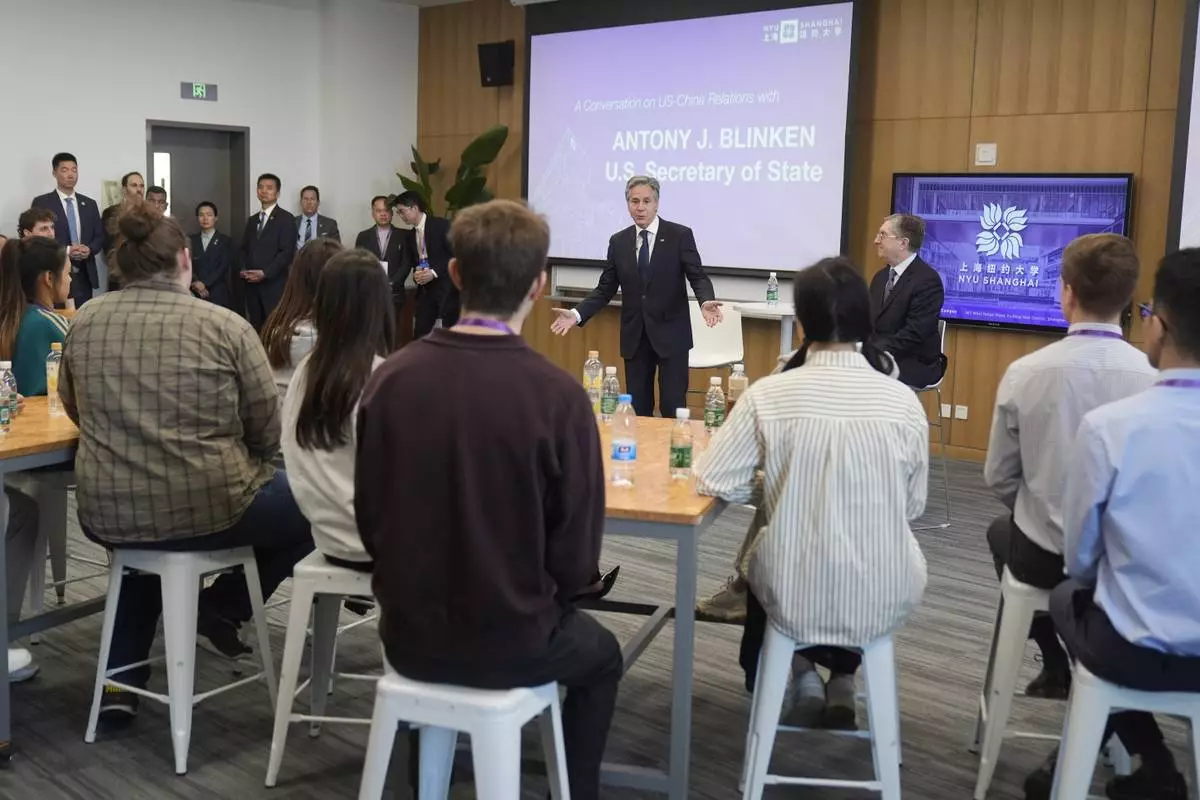
U.S. Secretary of State Antony Blinken, center, with NYU Shanghai Vice Chancellor Jeffrey Lehman, back right, talks to students at NYU Shanghai, Thursday, April 25, 2024, in Shanghai, China. (AP Photo/Mark Schiefelbein, Pool)
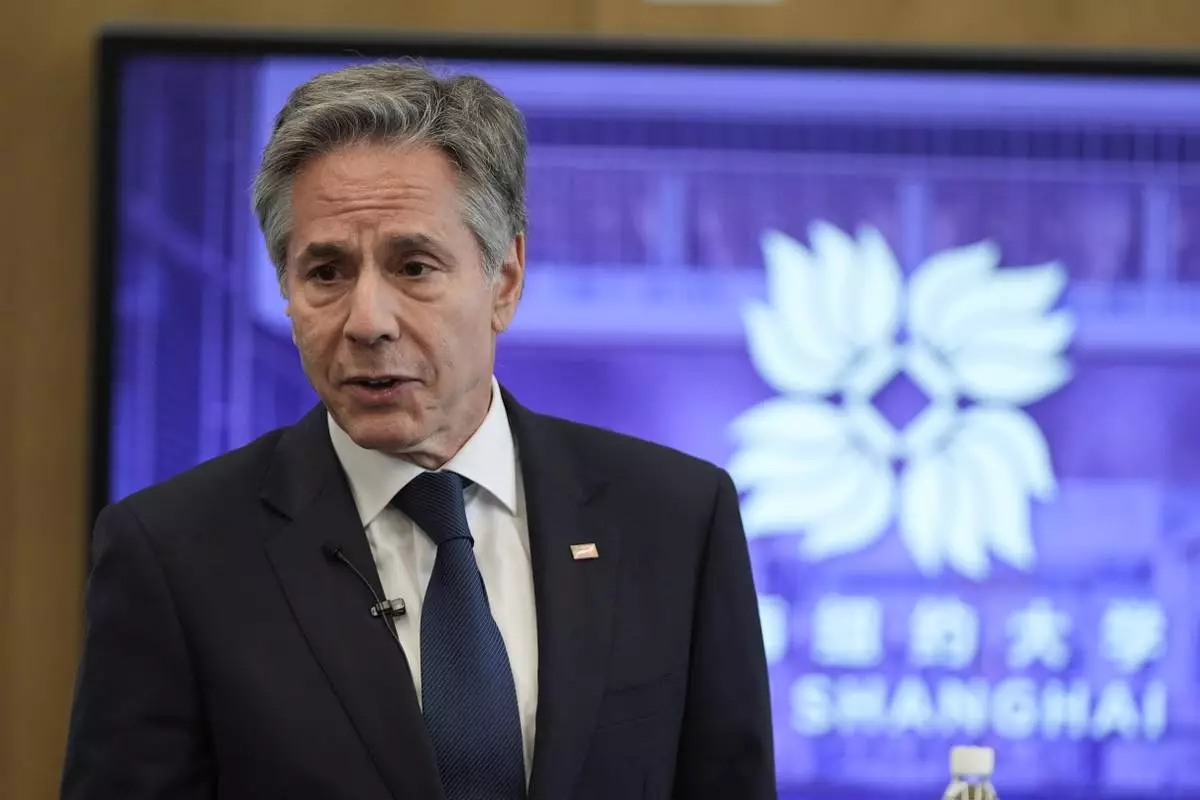
U.S. Secretary of State Antony Blinken talks to students at NYU Shanghai, Thursday, April 25, 2024, in Shanghai, China. (AP Photo/Mark Schiefelbein, Pool)
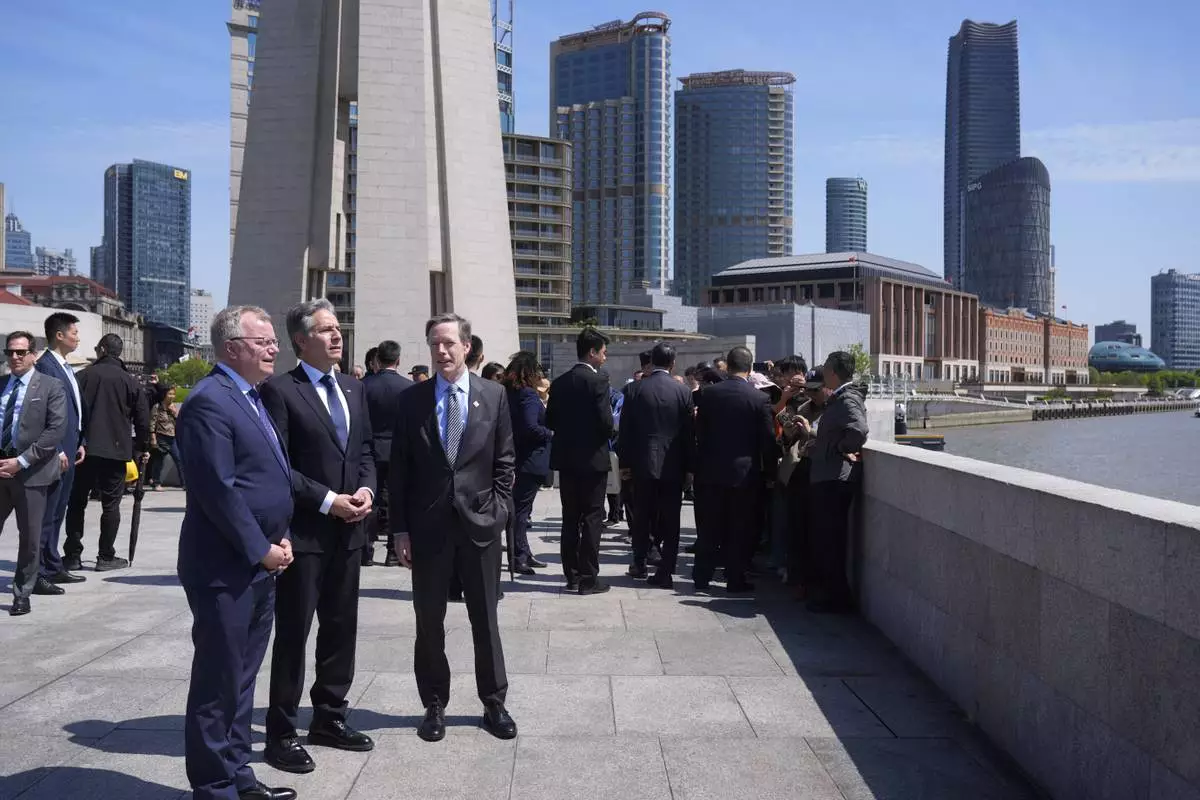
U.S. Secretary of State Antony Blinken, second left, U.S. Ambassador to China Nicholas Burns, third left, and Scott Walker, left, Consul General at the U.S Consulate General in Shanghai, visit a waterfront area called The Bund, Thursday, April 25, 2024, in Shanghai, China. (AP Photo/Mark Schiefelbein, Pool)
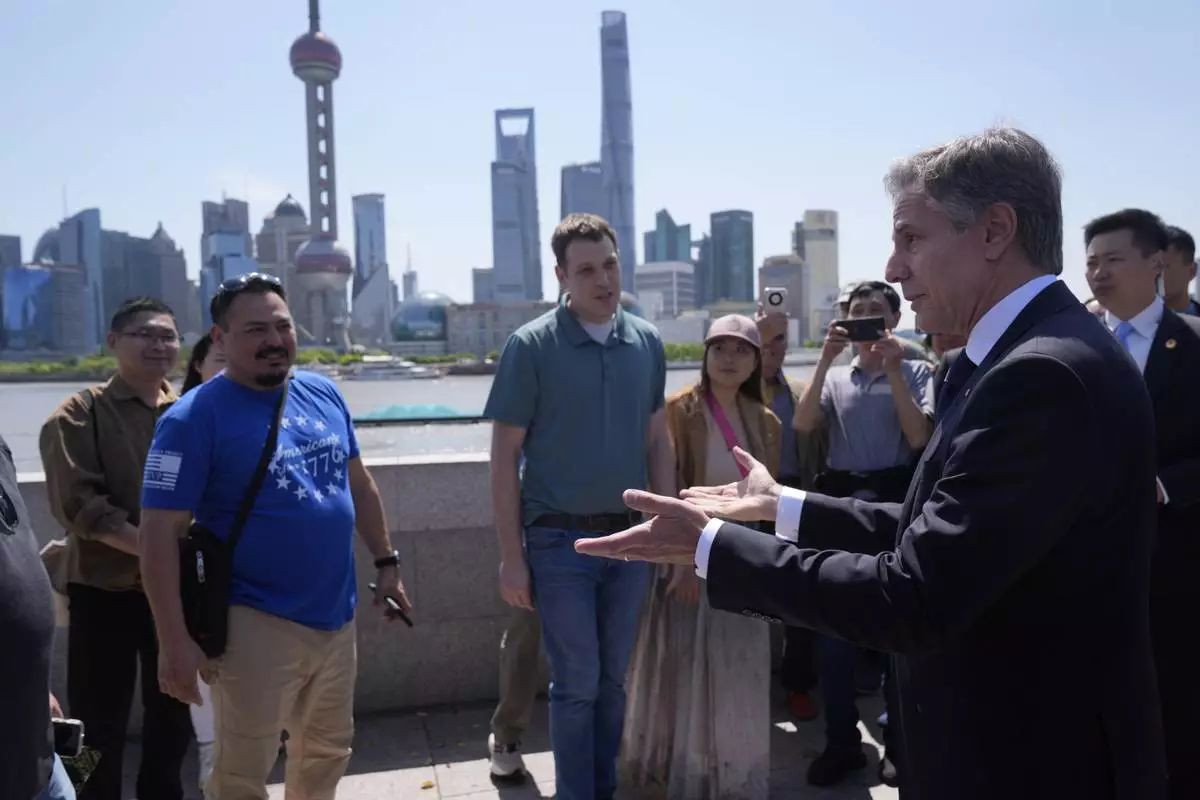
U.S. Secretary of State Antony Blinken, right, talks with U.S. tourists as he walks in a waterfront area called The Bund, Thursday, April 25, 2024, in Shanghai, China. (AP Photo/Mark Schiefelbein, Pool)
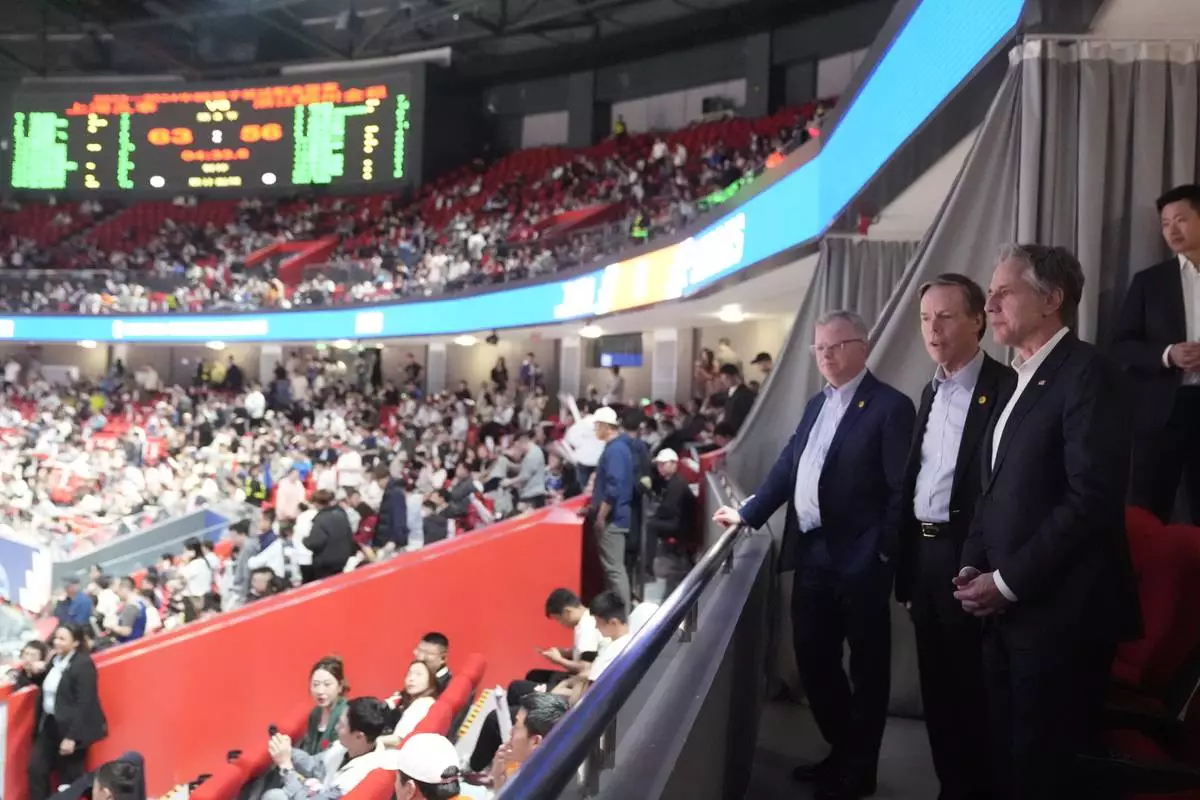
U.S. Secretary of State Antony Blinken talks with U.S. Ambassador to China Nicholas Burns, center, with U.S. Consulate General in Shanghai Scott Walker, left, while attending a basketball game between the Shanghai Sharks and the Zhejiang Golden Bulls at the Shanghai Indoor Stadium, Wednesday, April 24, 2024, in Shanghai, China. (AP Photo/Mark Schiefelbein, Pool)

U.S. Secretary of State Antony Blinken talks with U.S. Ambassador to China Nicholas Burns, center, with U.S. Consulate General in Shanghai Scott Walker, right, while attending a basketball game between the Shanghai Sharks and the Zhejiang Golden Bulls at the Shanghai Indoor Stadium, Wednesday, April 24, 2024, in Shanghai, China. (AP Photo/Mark Schiefelbein, Pool)
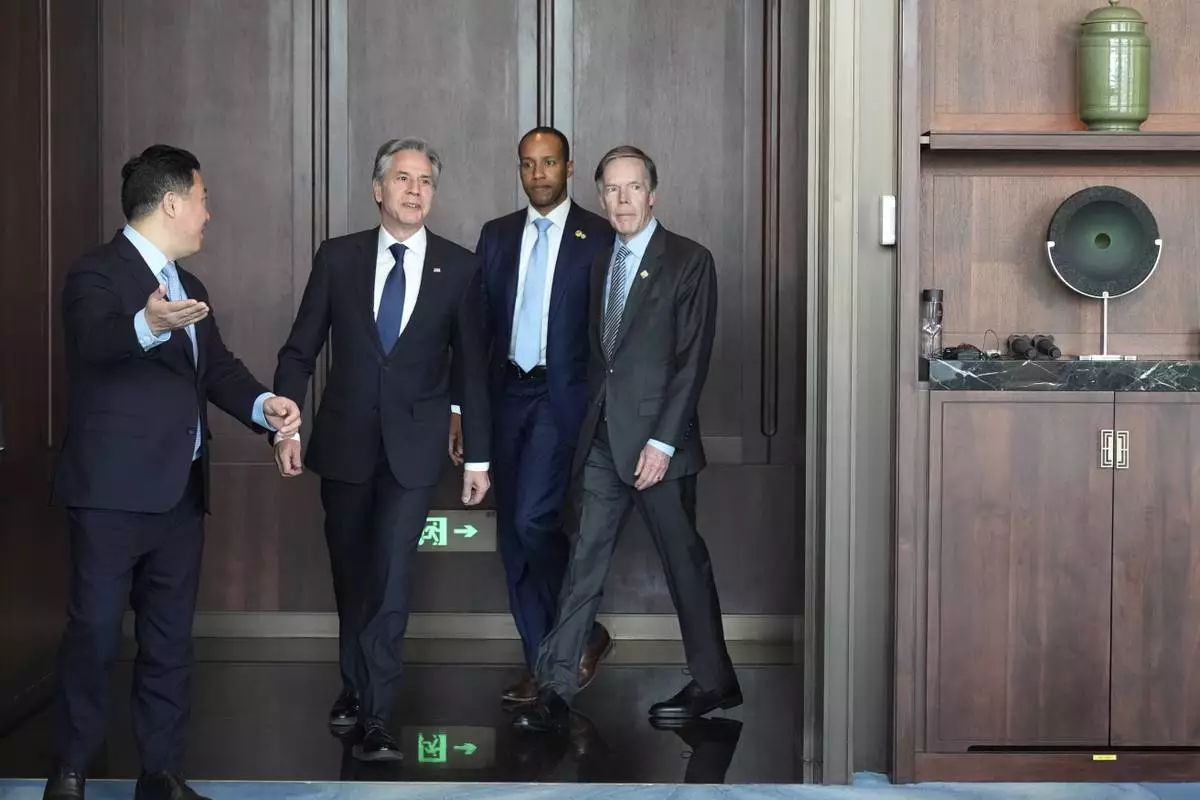
U.S. Secretary of State Antony Blinken, second left, and U.S. Ambassador to China Nicholas Burns, far right, arrive at the Grand Halls to meet with Shanghai Party Secretary Chen Jining on Thursday, April 25, 2024, in Shanghai, China. (AP Photo/Mark Schiefelbein, Pool)
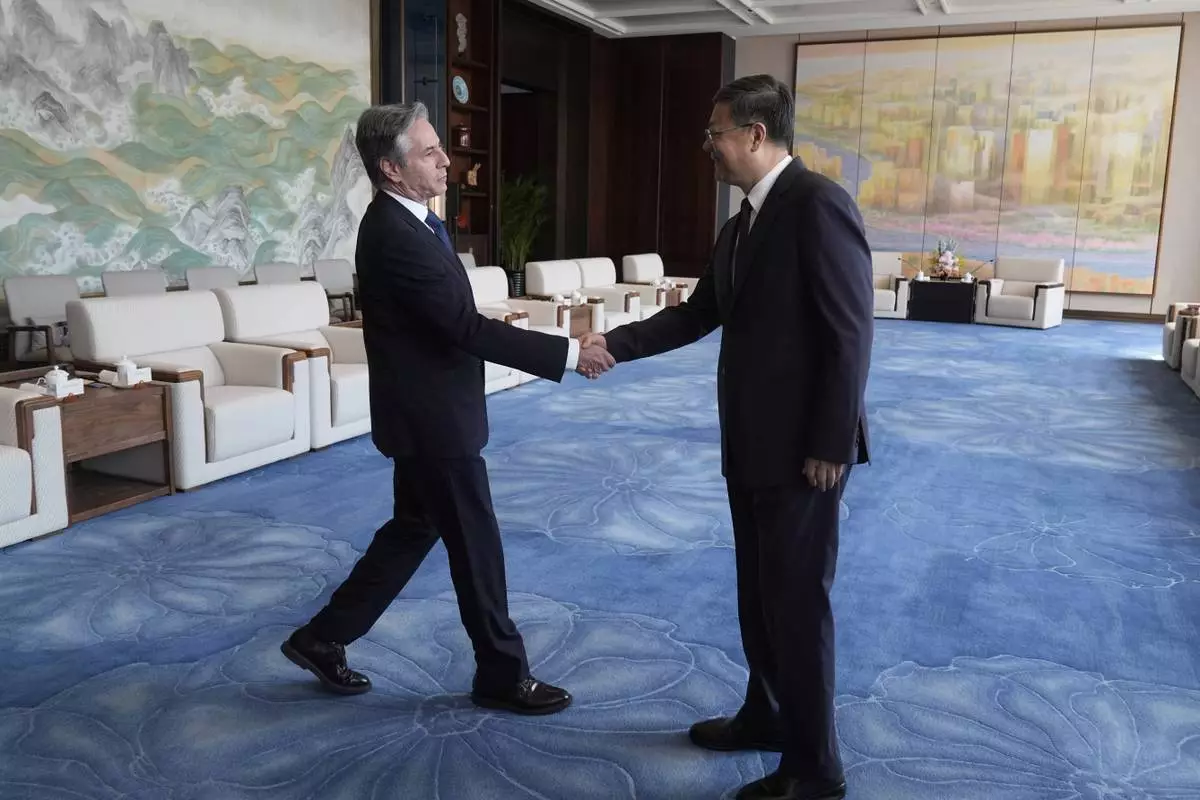
U.S. Secretary of State Antony Blinken, left, shakes hans with Shanghai Party Secretary Chen Jining as they meet at the Grand Halls, Thursday, April 25, 2024, in Shanghai, China. (AP Photo/Mark Schiefelbein, Pool)
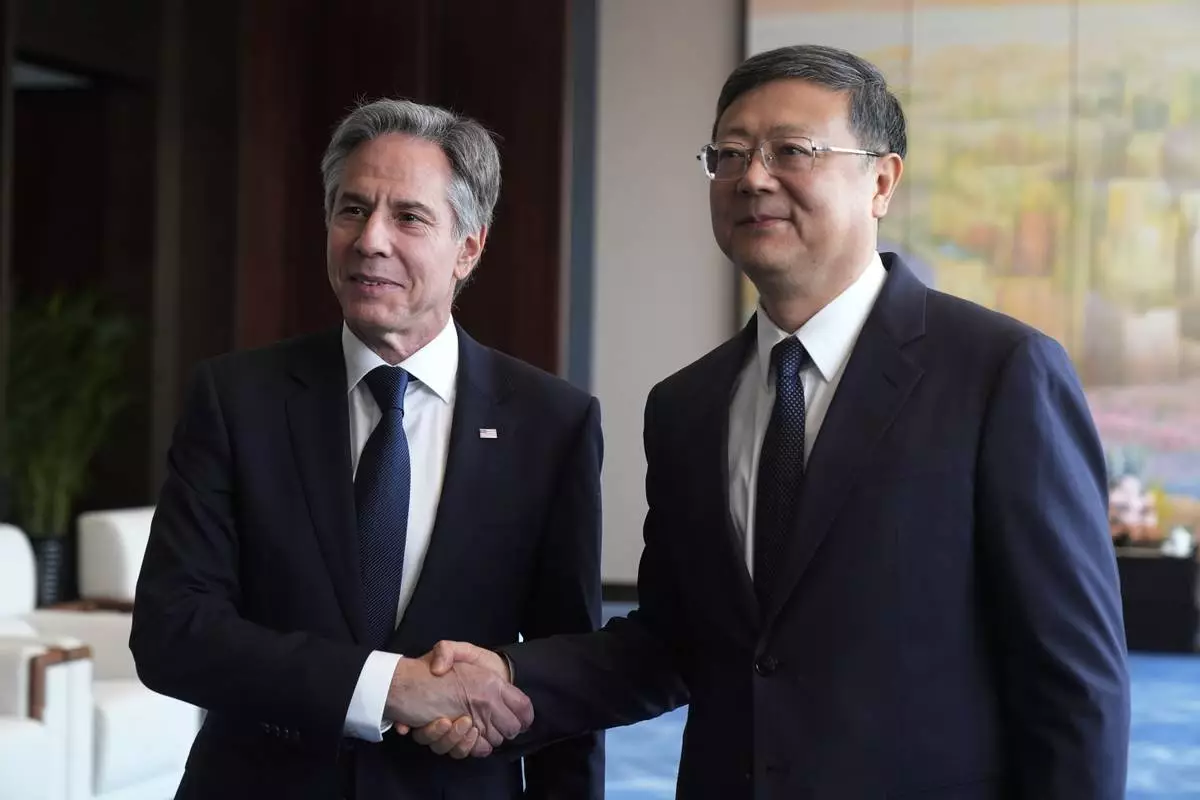
U.S. Secretary of State Antony Blinken, left, meets with Shanghai Party Secretary Chen Jining at the Grand Halls, Thursday, April 25, 2024, in Shanghai, China. (AP Photo/Mark Schiefelbein, Pool)
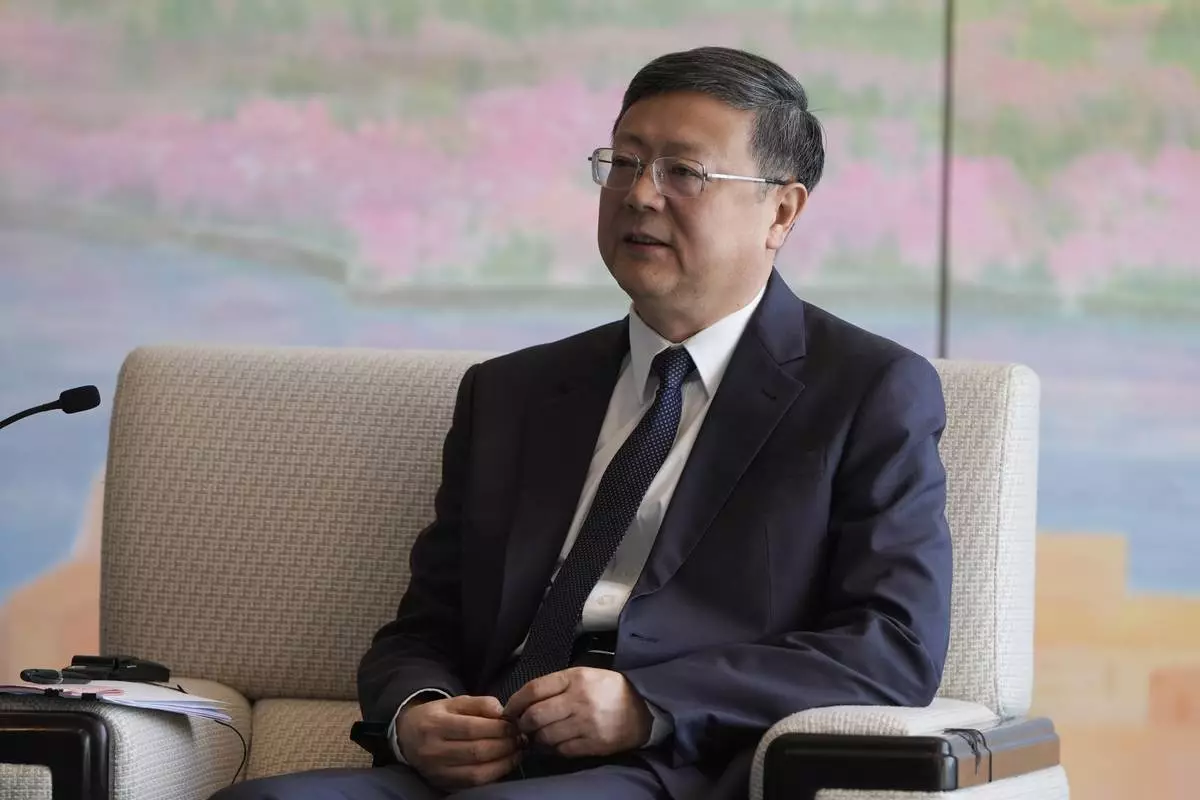
Shanghai Party Secretary Chen Jining talks with U.S. Secretary of State Antony Blinken at the Grand Halls, Thursday, April 25, 2024, in Shanghai, China. (AP Photo/Mark Schiefelbein, Pool)
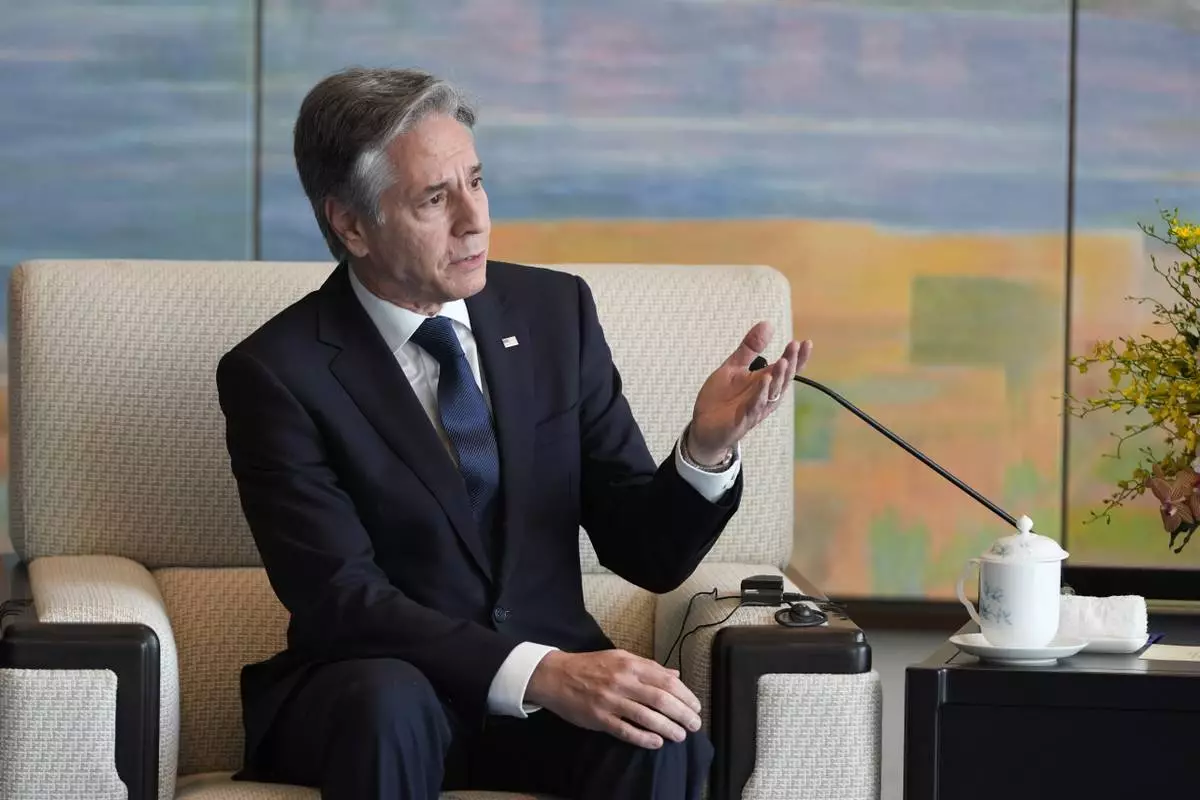
U.S. Secretary of State Antony Blinken talks with Shanghai Party Secretary Chen Jining at the Grand Halls, Thursday, April 25, 2024, in Shanghai, China. (AP Photo/Mark Schiefelbein, Pool)
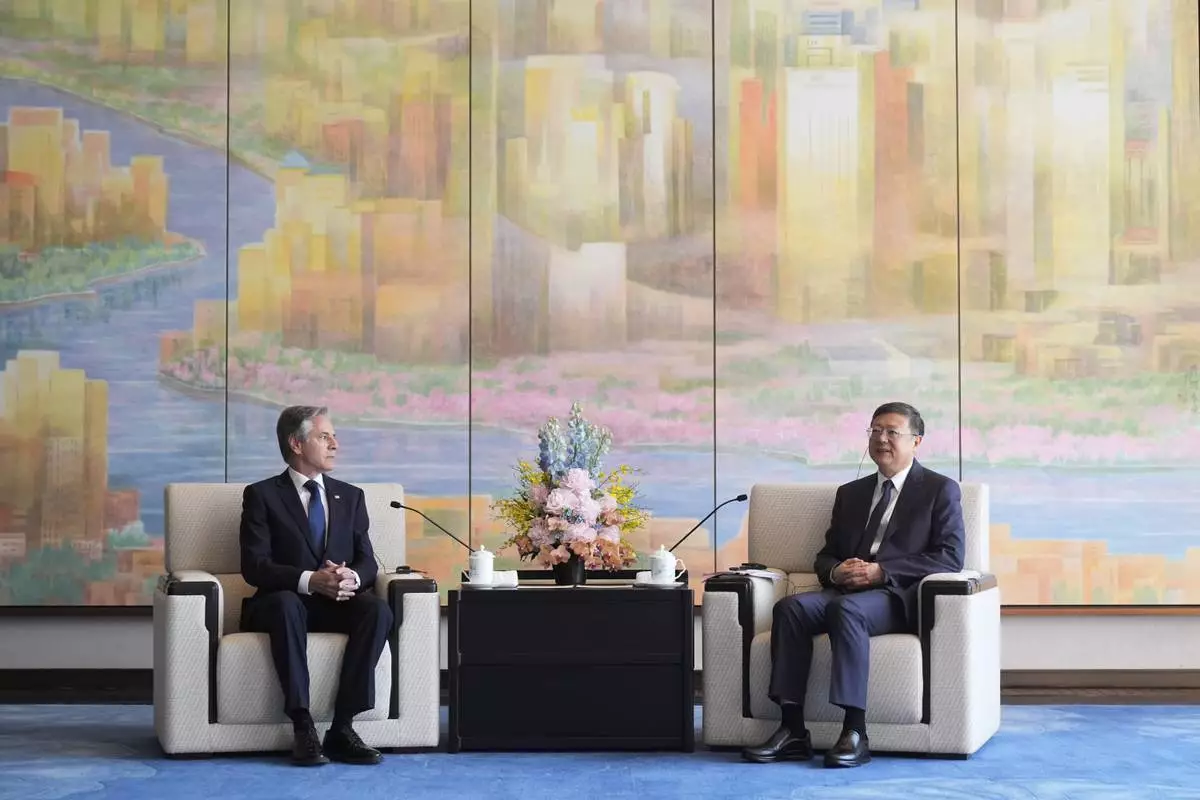
U.S. Secretary of State Antony Blinken, left, talks with Shanghai Party Secretary Chen Jining at the Grand Halls, Thursday, April 25, 2024, in Shanghai, China. (AP Photo/Mark Schiefelbein, Pool)
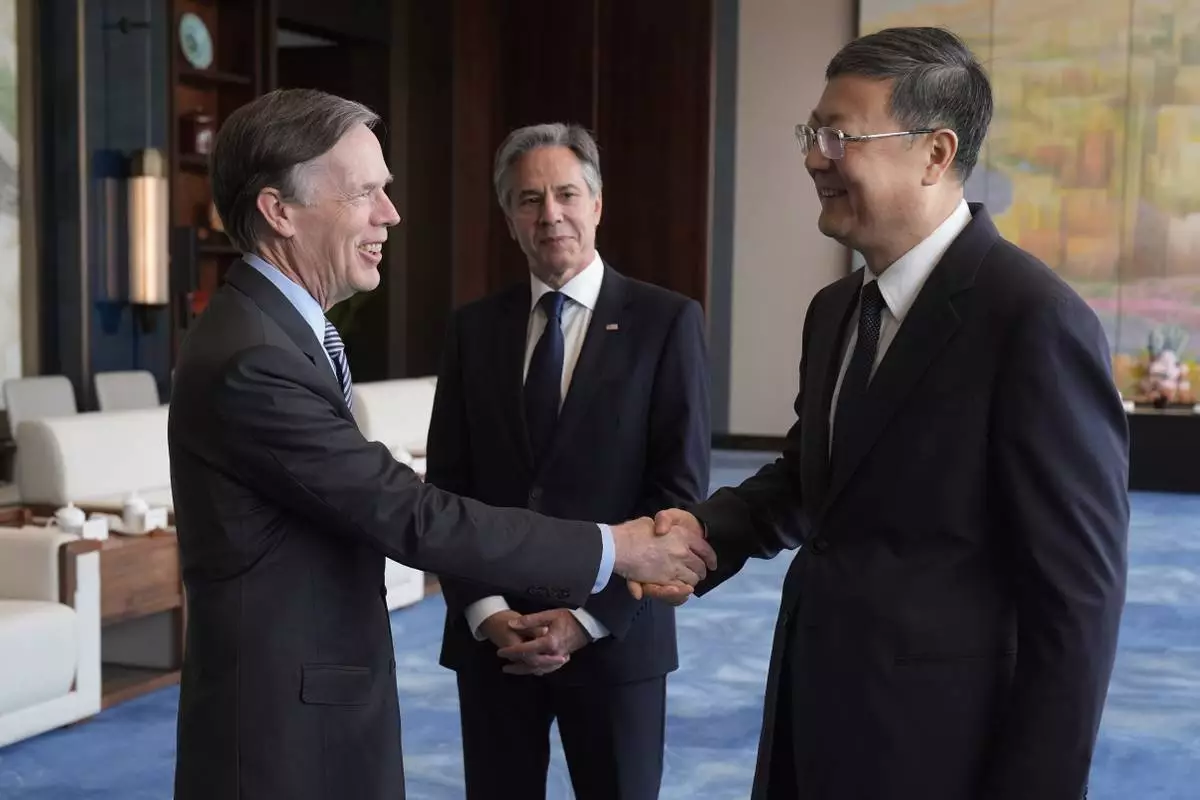
U.S. Secretary of State Antony Blinken, center, watches U.S. Ambassador to China Nicholas Burns, left, shake hands with Shanghai Party Secretary Chen Jining at the Grand Halls, Thursday, April 25, 2024, in Shanghai, China. (AP Photo/Mark Schiefelbein, Pool)






















